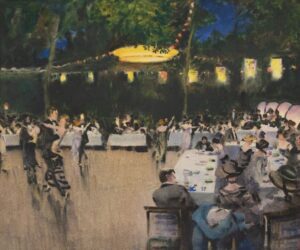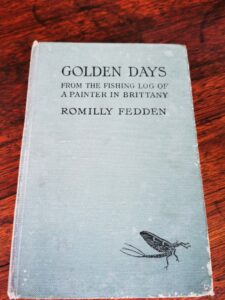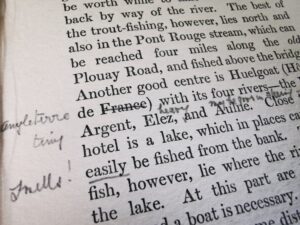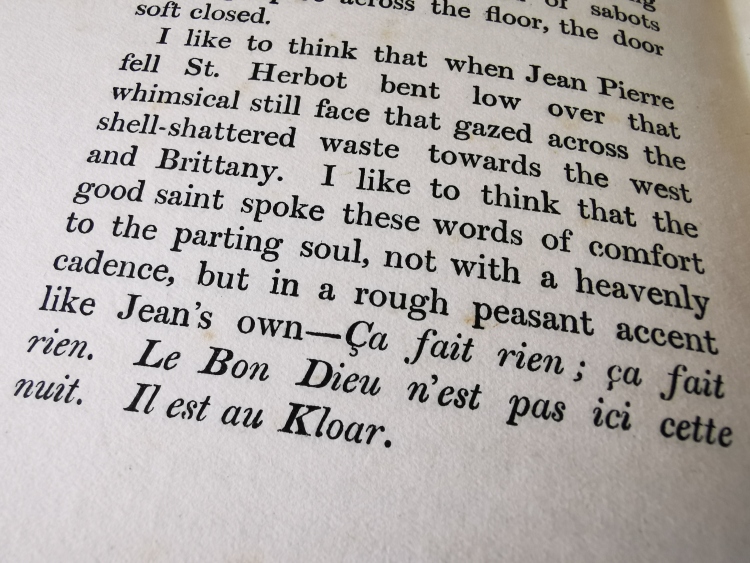Funny. I remember reading somewhere that Romilly Fedden’s book was dark and sombre, and that caused me to imagine that the book contained some of his artwork. The sub-title “From the fishing log of a painter in Brittany” may have pointed me in that direction too.
The book is not illustrated. It need not be.

Fedden was a talented man. His prose communicates the feeling and mood of a setting in exactly the same way his beautiful artwork does. He had a fine gift of being able to draw you into a scene, whether it be with the pen or a brush. And no, I didn’t find his work sombre. Thought provoking, definitely. Nostalgic, yes. True, he was a romantic, and when the weight of the horrors of war demanded it, he wrote a few heavy lines. To have skipped those lines would have served to make light of the horrors of world war one, but Fedden services the need.
Between his opening, which remarkably describes him exiting the front lines for an interlude of fly fishing in 1918, and his ending, which sees his departure from Brittany as the Germans amass, ready to invade in 1914, are many light lines.

His writing skips along at times. When he describes using his floating leader as an indicator, and a bead in a nymph pattern to attain depth, you would be forgiven for thinking he was writing a hundred years later. Not since I read The Dry Fly and Fast Water by George La Branche (written in 1914) have I been so pleasantly surprised at the apparent modernity of old writing.
That said, in chapter 2, Fedden wades through seemingly meaningless superstitions, saints, and apparently dodgy theology apparently defying the chapter title: Breton Trout Streams. To be honest, I found myself skipping some of this mumbo-jumbo. But then I did a bit of research about Breton and came to understand Fedden’s inclusion of this material. Breton, you see, is (or perhaps was) a backwater. A region in which a Celtic language was spoken, and in which the residents were seen by outsiders as a bunch of superstitious backward peasants. Simpletons perhaps. The author seeks to set out their cultural ways, their exclusions from fast-paced Paris and politics, their arcadian ways. These are poor people to whom fish are food, and the method used to capture them is not of the essence. The author makes no bones about the fact that the rivers are heavily poached, sometimes coloured and often fished with worms. And he has inserted himself into this culture with a humble appreciation, and doesn’t take himself too seriously as he sets about the use of a delicate dry fly when he can.
What is interesting about the copy I have is that the margins have been marked in pencil by a reader who, it becomes apparent, has tried to use the book as a flyfisher’s tour guide. The comments are negative and call Fedden out for seemingly glorifying waters that are in fact tiny muddy ditches. In one place the annotation says “Smells!”. Then, amusingly , the author writes “There are two people who should not visit Brittany for purposes of sport- the dry-fly purist, and his friend the owner of fat parklands with stocked waters.” He goes on to say “For them this fishing would be one long di-illusionment and vexation” and to describe waters devoid of fish, and peasants showing off their nets. Elsewhere he writes “ Brittany is not the place for the eager fisherman with only ten days at his disposal”

After these lines all smirky, dismissive comments in the margins come to a stop: a detail that put a smile on my face. In the same light I contemplated Charles Fox’s similar comments about the Yellow Breeches in the USA , and things I have said to erstwhile day-trippers who phone me to ask about fishing the uMngeni for a morning from Ballito.
Where Romilly Fedden comes into his own is when his language is let loose on describing days on the river, and the locals sitting before a log fire afterwards. His language and imagery are lovely. His chapters on “Random memories” and “Notes from a diary” stand out.
“ Gradually the roar of the storm fell away, and through it rose the sound of falling rain, and then the great drops were measured singly, less and less, to leave at last their echo, the drip from the soaked alder boughs that overhung the river. The sun broke out on a golden world, refreshed, touching all beautiful things to make them new. The Valley was sparkling, green, and fragrant. Far away the grey hills still reverberated with the whisper of the storm. In a near thicket a bird was singing in exaltation, and , most wonderful of all, at the foot of the mill-pool three trout were rising steadily.”
Romilly Fedden

These are peppered with a deep appreciation for his local Breton friend Jean Pierre. One gets a sense that the book is an ode to this Jean Pierre. As the book comes to a close, he describes waving good bye to Jean Pierre as he bids him farewell from the station platform on his hasty departure before the outbreak of WW1.
The last two pages trace Fedden’s steps to the chateau where a forlorn father mourns the falling of his only son to a German bullet: Jean Pierre. The book is indeed an ode. An ode to Jean Pierre, and to Brittany and to the Bretons, and to peacetime in the French countryside. And a cry in the face of materialism.
“And when the end comes- as it will for some of us- can we relive our golden days? lay hold upon reality? Find simple kindly ways again? Or have we grown too old under the heel of might, inured to power, to speed, to all things obvious, tangible, moulded by concrete fact – stunned-bludgeoned by materialism? Might we pass hence only to leave this brazen god of ugliness triumphant?”
Romilly Fedden
Fedden joined the war effort in France and saw out the end of the war, writing much of this book from his billet to the sound of the night guns.
A good book moves the reader.
This book, despite its age, moved me.

2 Responses
Sounds like a melancholy read, Andrew – WW 1 always strikes me as an horrific event.
However, I would like to know what you say to erstwhile day-trippers from Ballito who enquire about fishing the Umgeni for a morning?!
Ha ha…I try to keep it polite Richard.